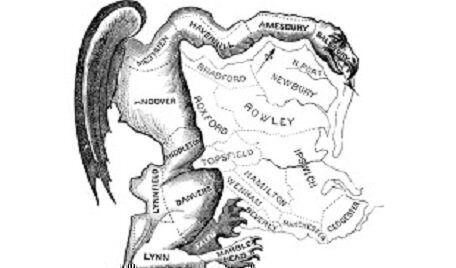On Wednesday, the Supreme Court will hear its second gerrymandering or political redistricting case of its current term. This time, it is the Republicans who claim they suffered a First Amendment rights violation in Maryland.
 In Benisek v. Lamone, Republicans leaders want the Court to establish a First Amendment test for gerrymandering after the Democrats redrew a solidly GOP House district in 2011 to strongly favor a Democratic candidate.
In Benisek v. Lamone, Republicans leaders want the Court to establish a First Amendment test for gerrymandering after the Democrats redrew a solidly GOP House district in 2011 to strongly favor a Democratic candidate.
How much of a switch was caused by changing the map lines? Roscoe Bartlett, the Republican who represented the Sixth District for 20 years, lost by a 21 percent margin to 2012 after he won the 2010 election by a 28 percent margin.
The Republicans believe the First Amendment political free speech and assembly rights of GOP members in the Sixth District were grossly violated by the redistricting efforts, which was a retaliation effort by the Democrats to suppress the Republican vote. They also want the Court to step into the case because of its potential national impact. “What happened in Maryland’s Sixth District in 2011—and what is sure to happen all over the Nation in 2021 absent this Court’s intervention—is a clear violation of the First Amendment, which forbids States from disfavoring citizens on the basis of their political views,” they argue.
After an extensive discovery phase, a split federal district court panel denied the GOP’s claims for injunctive relief. The Supreme Court took the appeal to consider four questions. First, can a federal court actually decide a First Amendment retaliation claim about gerrymandering? If so, do the Republicans need to prove the district changes will affect every election going forward? Or should the burden actually be on the Democrats to prove their acts influenced every election going forward in a biased way?
In their court filing, the Democrats say the three-judge panel didn’t have grounds to decide First Amendment partisan gerrymandering claims and that the panel correctly acted to deny the injunction demanded by the Republicans.
The Maryland case will be closely watched when it is decided as it relates to the more publicized gerrymandering case already heard by the Court back on October 3: Gill v. Whitford.
Last October, Justice Anthony Kennedy appeared to be the swing vote in the Gill v. Whitford case, where Democrats in Wisconsin claim gerrymandering violated their constitutional Equal Protection rights. Kennedy, however, appeared to be considering a First Amendment free-speech test about gerrymandering, an argument he made in another Court decision in 2004 about election maps.
So far, the Court hasn’t decided Gill v. Whitford but it recently denied a third redistricting case out of Pennsylvania that related to state constitutional concerns.







